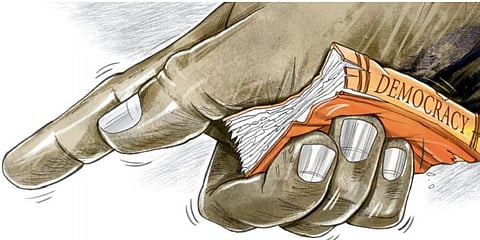

In the final week of June each year, since 1977, a ritual remembrance of the Emergency takes place. There is great political symbolism to this act of recall. This June 25 too, there was some aggressive messaging from the nation’s two top leaders—Prime Minister Narendra Modi and Union Home Minister Amit Shah.
Modi had three tweets related to democracy on June 25. Two of them carried the #DarkDaysOfEmergency hashtag. The third told us about the strength of democracy in the context of his meeting with leaders from Jammu and Kashmir the previous day. In tweets where there was a direct reference to the Emergency, he said the years between 1975 and 1977 “saw a systematic destruction of institutions”. He also spoke about how the Congress had “trampled over our democratic ethos”.
In a piece that Shah wrote to mark the occasion, he was far more strident in his targeting of the Congress. He said the Emergency was an “ugly spectacle of authoritarian arrogance” and it “represented the natural instincts of the Congress’s dynastic politics”. He also made a bombastic claim that India’s ancient history as well as the Vedic period was “replete with examples of flourishing democratic governance systems” that the Congress had demolished in 1975, and signs of this tragedy’s imminent arrival were known the day Jawaharlal Nehru took over the reins. Figures of speech in general, and irony particularly, are known to continuously conjure methods to paradoxically end their own existence and perhaps Shah’s assertions were one such illustration.
Whatever the views that turn out to be new measurements of vengeful enthusiasm, there is one larger issue that needs to be pointed out here: Emergency anniversaries have seldom led to a reflection on the health of our democracy but have often ended up being a blame game. None have shown the enterprise to convert it into a solemn day when a state-of-our-democracy review is presented to the nation. This is because the Emergency has been viewed as an event and an aberration. An event that happened under somebody else’s charge in the receding past and has nothing to do with the present. It is also a clever way of fixing the responsibility of this past occurrence and future possibility to just one political party—the Congress.
When transition was happening between former US President Donald Trump and current head Joe Biden in January 2021, after the Capitol attack, prominent voices there spoke about the fragility of democracy and the need to keep permanent vigil. There is no such institutionalising in our context. There is only blame. Despite Indira Gandhi herself realising the Emergency was a mistake and Rahul Gandhi openly stating that it was “a mistake” as recently as March 2021, the Congress has not figured out a bold way to convert the June anniversary into a day of warning about the dangers to democracy. On the contrary, it seeks to differentiate the situation then and now. Rahul Gandhi said what happened in 1975 was wrong but it was fundamentally different now when the RSS has “penetrated every institution including judiciary, bureaucracy, Election Commission and the press”.
This caveating may not be a good strategy because it essentially reads like a cussed, bitter response to the 1975 charge, even though it isn’t. Indirectly, it helps the Congress’s political opponents establish the Emergency as a one-off episode that was made possible by one political dynasty. It is marketed as a second freedom struggle because the RSS is anyway given credit for building a pan-India network to resist the Emergency. The recent book by Christophe Jaffrelot and Partinav Anil, India’s First Dictatorship—The Emergency, 1975-77, which is encyclopedic in its detailing and resonant in its narrative, says: “There was nevertheless enough convergence between the JP [Jayaprakash Narayan] Movement and the Hindu nationalist organisations for Narayan to remark in 1975 that the ‘Bihar movement and RSS’s work are fundamentally the same’. Broadly, their worldviews converged … Certainly, Narayan let on that he was not particularly hung up on the Sangh Parivar. In his overtures to the CPI(M), for instance, he said to Jyoti Basu in 1974, ‘if you join’ the movement ‘these fellows [i.e. the RSS] will run away’; Narayan suggested that he had taken them on board only on sufferance, for ‘our party is not there [sic], nothing is there, and they have an organisation’. It is likely that these were but superficial extenuations that Narayan cared little about so long as they served his purposes … The Left could be jettisoned with no love lost, but the relationship between the JP Movement and the Hindu nationalists was another matter.” The book recalls that when the RSS chief Balasaheb Deoras declared the JP Movement as “a force for the good of the society”, Narayan reciprocated the encomium by telling an RSS crowd in March 1975 that “if you are a fascist, then I too am a fascist”.
The other aspect in the Jaffrelot and Anil book that makes it possible for us to understand that the Emergency need not be an event in the contemporary past is when it discusses how the 1975-77 period was not only India’s first dictatorship but also a ‘constitutional dictatorship’. That is, how authoritarian intent can be forwarded by rigging the Constitution and making everything sound legitimate with sophistry. The authors write: “For political parties had not been banned, even if many of their leaders were behind bars ... Parliament remained functional, despite many MPs wasting away in jail … Mrs Gandhi had made certain not to step outside the boundaries of the Constitution … the law was used to, as it were, undermine the law … Old institutions remained, but they did so under novel pressures.” In essence, an Emergency can be slipped in without making it appear like major works in the nation’s firmament. That is, the spirit may be killed, but a ventilator can keep extending life.
Sugata Srinivasaraju
Senior journalist and author
(sugata@sugataraju.in)